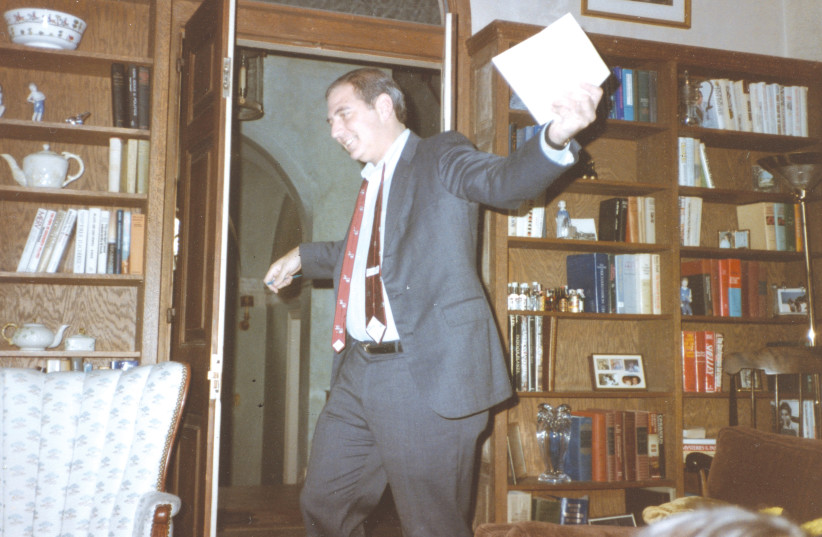Everyone is inconsistent but few are such a bundle of extreme contradictions as Arthur Finkelstein, the subject of the new documentary, The Consultant, directed by Ido Zukerman and produced by Assaf Peretz, which is currently available on Hot VOD and will be showing at film festivals around the world in the coming year.
Finkelstein was the master political consultant who changed political campaigning all over the world forever by identifying and mobilizing disaffected voters on the Right through a kind of divisive, in-your-face messaging that has become the new normal. He was influential in getting Republican candidates elected, including presidents, in the United States.
He also worked in Israel, where he was hired by former prime minister Benjamin Netanyahu and was instrumental in helping Netanyahu pull off an upset victory against Shimon Peres, in 1996. But, as this fast-paced, well-made documentary shows, in spite of the fact that professionally, he was identified with the Right – and sometimes far-right politicians – he was a homosexual who had a longtime partner whom he eventually married and together they raised two daughters, in an era when this was extremely rare.
Perhaps the greatest contradiction, which the film does not address in-depth, was that he worked for authoritarian Hungarian Prime Minister Viktor Orban, who supported initiatives that cracked down on the freedom of the LGBTQ community, and vilified philanthropist and financier George Soros in a campaign many have criticized as blatantly antisemitic.

Painting the political world in a clearer picture
One of the most interesting insights in this documentary is that Finkelstein studied economics and had an early interest in computers since his talent for analyzing data was a key part of his success. He had a great skill for paring down the messy world of politics into black-and-white categories that made it easy for politicians to have a clear message.
In America, he identified the “peripheral urban ethnic,” working-class white ethnics – Irish, Italian, Polish, Jewish, etc. – who lived in the neighborhoods and suburbs outside the inner cities, which were mostly inhabited by wealthy whites and minorities. These urban ethnic voters were personified by the character Archie Bunker of the hit 1970s sitcom, All in the Family, and had traditionally voted for the Democrats, but Finkelstein intuited that they could be influenced to switch to the Republican Party.
THE REST, as the expression goes, is history but watching this history unfold is fascinating, as Finkelstein identifies and exploits “the emotions behind the numbers,” as one colleague puts it. As crime skyrocketed in the 1970s, the voters to whom Finkelstein appealed became increasingly concerned with law and order issues, while liberals tended to focus on social justice issues and Finkelstein’s early Republican candidates focused on this divide to win them over. He was a pollster and a key adviser to presidents Richard Nixon and Ronald Reagan, as well as senators, including Alfonse D’Amato and Jesse Helms, and many other politicians.
When he was invited to work for Netanyahu, he saw that in Israel the divide was over peace vs. security issues, and he fought to win the hearts and minds of voters who saw themselves as Jews first and Israelis second. In his work on the Netanyahu campaign, Finkelstein painted Peres as a leader who would divide Jerusalem if he were elected, in spite of Peres’s protestations to the contrary. The tactic worked and Netanyahu defeated Peres, who was initially predicted to win, by a small margin.
Finkelstein died in 2017 and although there is footage from a video he made in 2016 when he was in failing health as he looked back on his career, the director of this documentary never got the chance to pose the hard questions to Finkelstein that any look at his life invites.
The very charismatic Finkelstein was clearly a man who had a skill for compartmentalizing his life as finely honed as his facility with polls and slogans. His husband, Donald Curiale, whom he married in 2005 after they had been together for decades, speaks with affection about Finkelstein. The two met in a gay bar, at a time when those frequenting such establishments risked being arrested and outed by having their names published in the newspaper when Curiale was a teenager and Finkelstein was not much older.
Curiale was a teacher and if anyone either of the men worked with had known about their relationship, it would have jeopardized their careers. They hired a housekeeper and when she became pregnant, they decided to raise her daughter with her as their own and later in the mid-1980s had a second daughter with a surrogate mother, when this arrangement was highly unusual.
Curiale emphasizes that Finkelstein kept his private life very private. But the question that comes up again and again of how could Finkelstein help the campaigns of so many candidates who actively opposed gay issues, such as same-sex marriage, and then proudly marry his partner shortly after such unions became legal in their home state of Massachusetts, remains unanswered.
After he was outed by Boston Magazine in 1996, Finkelstein felt angry and defensive as the contradictions in his life become public. He never seems to have articulated, either publicly or privately, any ambivalence he felt over his support for candidates who were anti-gay, or, in the case of Orban, antisemitic as well as anti-gay. This interesting but sometimes frustrating film demonstrates how Finkelstein took his contradictions to his grave.
